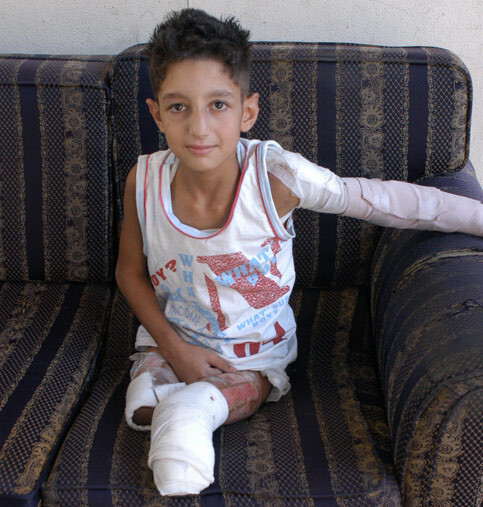23 January 2007

Twelve-year-old Mohamed Samer Elhaz Mouss, photographed in October 2006, was injured by Israeli cluster bomblets delivered by Israeli warplanes during the recent Israeli aggression on Lebanon. On 9 August 2006, in the Rashidieh Camp outside of Sour, Mohamed was running from attacking Israeli warplanes and hid behind a tree where he came into contact with unexploded bomblets. (Sam Costanza)
A joint humanitarian delegation, representing Australians For Lebanon (AFL), the Medical Association for Prevention of War (MAPW), and later joined by the Australian Lebanese Youth Association (ALYA), has recently returned to Australia from areas of Southern Lebanon heavily affected by cluster bombs. It is calling for a global ban on these inhumane weapons.
The delegation comprised Dr Hadia Mukhtar, Melbourne GP and Chair of AFL, Mr Phillip Salem, Sydney lawyer and member of AFL, and Dr Sue Wareham, Canberra GP and former president of MAPW. It was later joined by Mr Michael Helal, vice- president of the ALYA. The delegation spoke with authorities in Lebanon who are attempting to clear the munitions, including the National De-Mining Office and the UN Mine Action and Coordination Centre near Tyre in Southern Lebanon, and saw at first hand the terrible impact the weapons have on communities.
The UN Mine Action and Coordination Centre estimates that there are around one million unexploded cluster bombs still to be cleared in Southern Lebanon. Although all the cluster bombs are designed to detonate on initial impact, the failure rate is up to 40 percent, according to the UN. This means that very large numbers remain live, as land mines, on or just below the surface of the ground.
Dr Mukhtar, said, “Practically all of the victims are civilians, including children. In one location in Nabatieh, there were 14 casualties within a short time of the August 14 ceasefire coming into effect, as people started returning to their homes. Cluster munitions were found in houses, on roads, in gardens and in the rubble of destroyed buildings.” Dr Wareham commented, “These weapons make a mockery of the term ‘ceasefire’ ”.
Australians For Lebanon Dr Mukhtar said, “Currently many farmers have a choice between abandoning their land and only source of income, or risking death or mutilation.” The clean-up is significantly impeded by the failure of the Israeli Defence Force (IDF) to supply strike data on the type, location, and number of weapons used. “In addition to saving lives and preventing further suffering, the supply of this essential strike data would promote goodwill and a spirit of good faith between two neighbouring countries,” said Dr Mukhtar.
The delegation will soon be making a submission to the Australian Government calling for:
Dr Wareham stated, “These terrible weapons must never be used again against any people. Governments such as the Australian Government can play a very important role by pressing for a treaty to ban the production, stockpiling, transfer and use of cluster bombs.”
The delegation also notes with grave concern the revelation last week that government superannuation funds in the ACT — and almost certainly elsewhere — are invested with companies that produce cluster bombs. “This practice must cease”, Dr Wareham said. “Australians don’t want to support companies that trade in the death of civilians”.
For further information, please call: Dr Hadia Mukhtar: 0409 113 769 Dr Sue Wareham: (02) 6259 6062 or 0407 924 152 Sunday and after hours ; (02) 6241 6161 work Mr Phillip Salem: 0404828277
“Australians for Lebanon” is a national group established after the outbreak of the recent crisis in Lebanon on July 12 to represent the humanitarian concerns of all Australians towards the conflict. It has attracted strong support from all sections of the Australian Lebanese community and the broader Australian community. The Medical Association for Prevention of War (Australia) is an organization of health professionals that works for the abolition of all weapons of mass destruction, and for a reduction of the impact of war on humanity and the environment.
Related Links